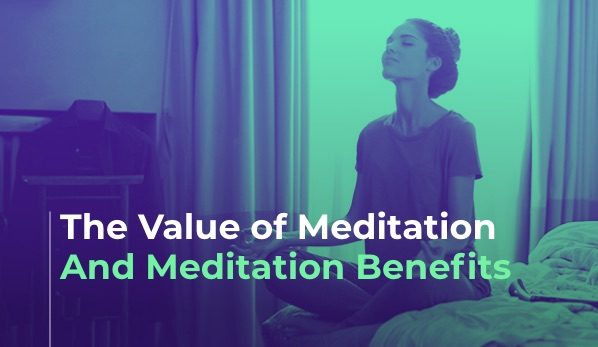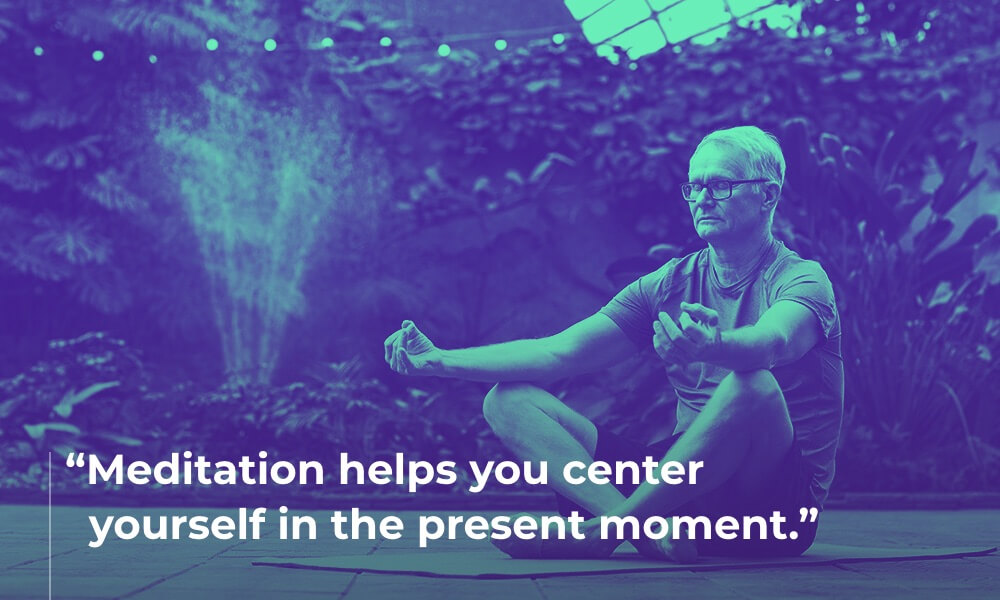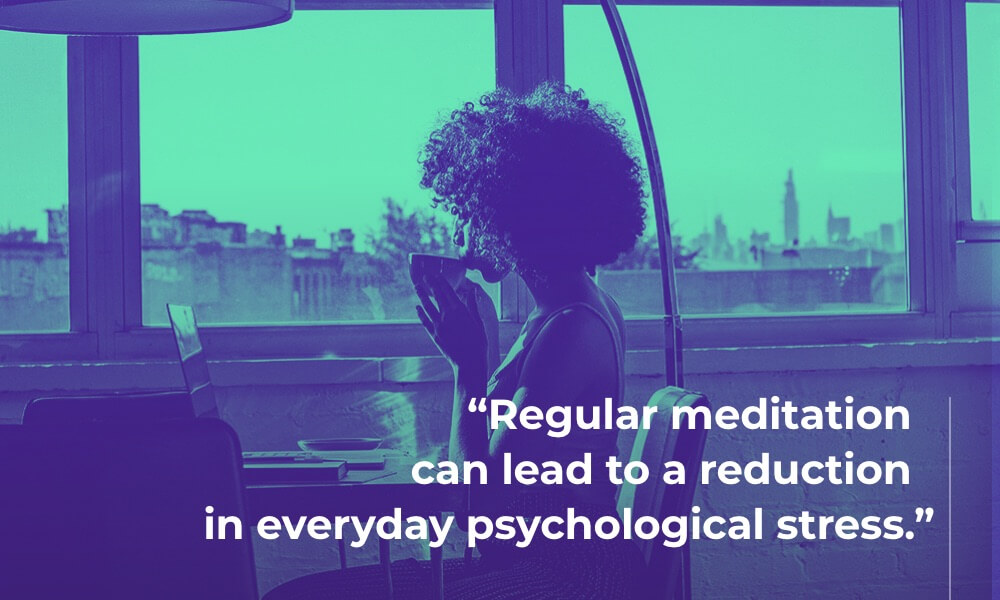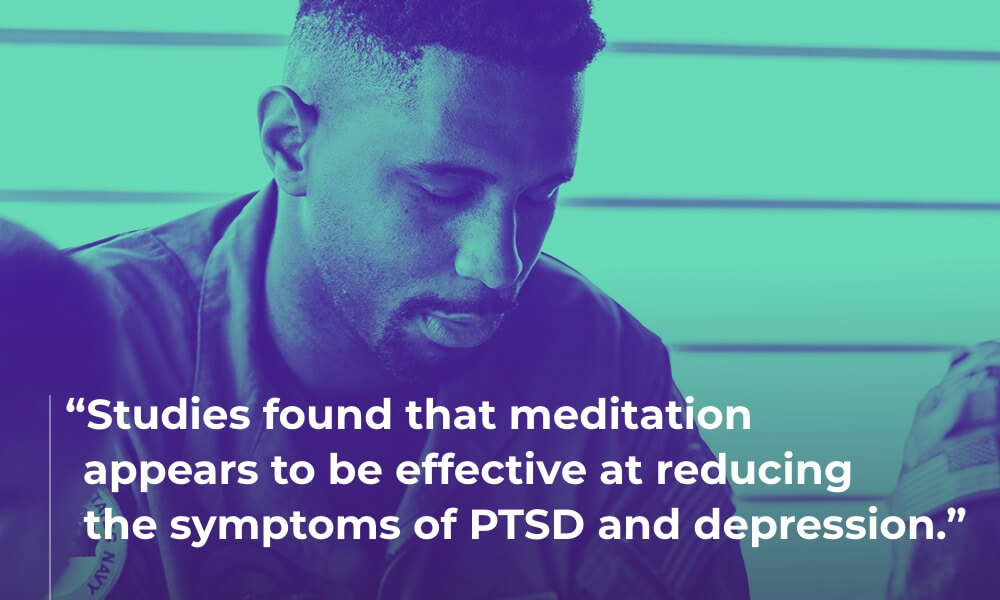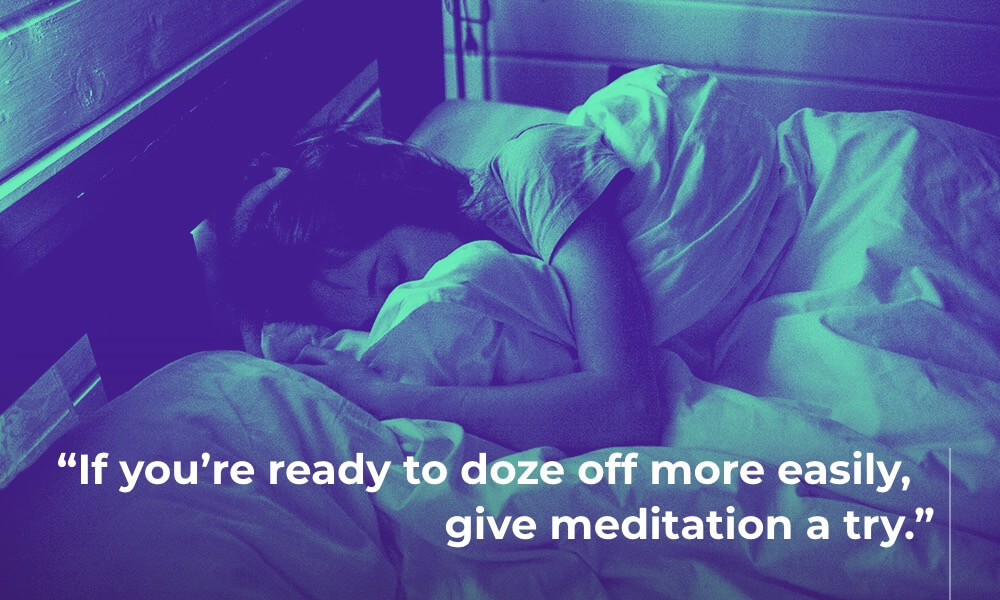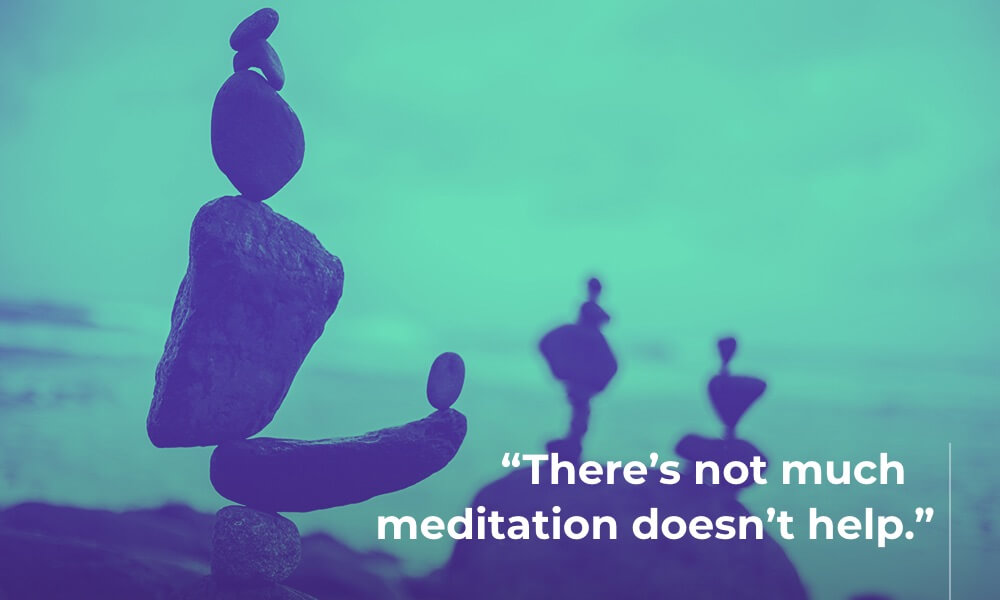Everyone wants to know the benefits of doing something before they do it–we get it! So for those of you wondering about the value of meditation, look no further. We’ve compiled a list of some of our favorite benefits of meditation because, as it turns out, there are a lot of reasons to take a few minutes to meditate each day.
From improving your immune system and increasing your self-awareness to enhancing your self-esteem and helping you cope with stressful situations, everybody can benefit from a meditation course! We’ll start by taking a look at exactly what meditation is and why it’s important. Then we’ll dive into some of the many meditation benefits you can expect for your mental health, physical health, and day-to-day life.
Why Is Meditation Important?
To understand why meditation is important, we must start by examining what meditation is.
Meditation is nothing more than sitting with yourself. It’s a way to gain perspective on your thoughts; it’s not a way to stop thinking completely. Meditation helps you center yourself in the present moment by allowing you to just sit and be aware of yourself, your thoughts, and your breath.
There are dozens of different types of meditation. You can do a body scan meditation by drawing your attention to the sensations in your body. Or you can do a loving-kindness meditation where you send loving thoughts to yourself and others. But one of the simplest types of meditation is a breathing meditation session.
To do a breathing meditation, sit on the floor (on a cushion) with your legs crossed or in a chair. Ensure that your spine is elongated.
Start by taking slow, deep breaths, drawing your attention to each inhale and each exhale. Then, return to your normal breathing pattern, but continue to keep all of your attention focused on your breath. Each time you notice your mind wandering, simply acknowledge it, and then return your attention to your breath.
And that’s it! You’ve just completed a mindfulness meditation session.
Meditation is one of the best ways to train ourselves to live in the present moment. This is important because our lives are happening in the present moment. A lot of times, when we’re afraid, anxious, stressed, or unable to focus, it’s because we’re living either in the past or future. When we’re able to live in the here and now, not only are we more content and peaceful, but we’re more productive and focused too.
Eckhart Tolle, renowned mindfulness teacher and author of “The Power of Now,” says this about living in the present:
“As soon as you honor the present moment, all unhappiness and struggle dissolve, and life begins to flow with joy and ease. When you act out the present-moment awareness, whatever you do becomes imbued with a sense of quality, care, and love – even the most simple action.”
So, meditation allows us to live in the present moment and enjoy the flow of life with joy, ease, and love. But what are the other benefits of meditation? Let’s find out.
Scientifically Proven Health Benefits of Meditation
Meditation can make a large, positive impact on your daily life. But it’s not a shortcut to solve your problems. And it’s definitely not a one-and-done solution; it takes frequent (preferably daily) practice, which isn’t as easy as it may seem.
It is worth it, though. Because meditation helps you accept and embrace reality, it makes everything from managing an illness to dealing with stress and anxiety more accessible. Meditation can also help you cultivate positive traits, like better attention and even healthier relationships. Let’s dive into some of the science-backed benefits of meditation.
Mental and Emotional Benefits of Meditation
One of the areas in which meditation shines is psychological health. This is good news, since your mindset determines your life, and meditation can help you cultivate a good mindset. In fact, meditation is so good for your emotional and mental health that it’s often recommended in conjunction with psychiatry and other wellness practices.
Helps Fight Signs of Aging
In our stressed-out world, you may be experiencing the perils of aging (like increased risk of heart disease, stroke, and cancer) sooner than you’d expect to be. Thankfully, one study found that after just a week, women who meditated daily showed improvements in the biomarkers in their blood related to aging and disease.
Improves Cognitive Performance
Who wouldn’t like to turn their brain power up a notch? It turns out, meditation can help you do just that! Studies show that mindfulness meditation training can improve brain function. In fact, one study found that just two weeks of mindfulness training improved reading comprehension, reduced mind wandering, and improved memory. It’s a win-win-win!
Lessens Stress
If you’re stressed out, you’re in good company. As of 2020, 60% of adults in the U.S. are stressed out daily. We don’t need to explore all of the negative health effects of stress—from headaches and high blood pressure to heart problems and fatigue—for you to know that you don’t want to feel that way.
Happily, mindfulness-based stress reduction (also known as MBSR) and meditation are proven to reduce stress and the stress hormone cortisol. A scientific review and meta-analysis of 47 trials found that regular meditation can lead to a reduction in everyday psychological stress.
Reduces Symptoms of Anxiety
Meditation can also help with stress’s equally vexing cousin: anxiety. If you regularly feel excessive worry and unease, try sitting with your breath. Studies show that meditation is a great way to calm down. In fact, a meta-analysis of studies on Transcendental Meditation found the practice to not only be effective, but research shows that it’s “more effective than [typical] treatment[s] and most alternative treatments” for anxiety. Meditation is effective whether you suffer only from occasional bouts of anxiety or have an anxiety disorder.
Helps to Combat Depression
You may not be surprised to learn that meditation is also proven effective in the battle against depression. One study found that chronic pain patients with higher than moderate levels of depression showed a notable improvement in their depression symptoms compared to non-meditators over the course of a year.
Reduces Negative Thinking
Meditation can also help combat a contributor to (and byproduct of) depression: negative thinking. It’s true what they say: attitude is everything. And while everyone’s entitled to a bad mood once in a while, a pattern of consistently negative thinking can have a corrosive effect on your mental health.
Thankfully one of the benefits of meditation is that it can help you think fewer negative thoughts. In fact, one study found that participants who practiced mindfulness meditation had fewer negative thoughts than non-meditators in response to negative images.
Lessens Feelings of Aggression
Meditation can also help those of us who struggle with feelings of aggression. A study focused on youth aggression found that a mindfulness-based program helped the youth relax and reduce their “anger, hostility, physical, and verbal aggression.” The study also determined that meditation can help increase positive emotions and improve quality of life.
Helps With Emotional Processing
Whether you’re feeling angry, worried, excited, or joyful, it’s important for your mental, emotional, and physical health to process these emotions. Often, we avoid doing this when the emotions feel overwhelming. But when we avoid working through our emotions, they tend to stick around and cause problems for us down the road. Thankfully, mindfulness meditation is proven to improve emotional processing.
Helps to Combat Addiction
If you struggle with addiction, meditation can be a helpful tool in your recovery toolbox. Current research indicates that mindfulness meditation can help to reduce substance abuse. Not only that, but it can also help with the contributing factors to substance abuse, like stress, cravings, and addictive behaviors.
Reduces Symptoms of Post-Traumatic Stress Disorder
There’s good news for people who struggle with Post-Traumatic Stress Disorder, or PTSD. A meta-analysis of 10 studies found that meditation appears to be effective at reducing the symptoms of PTSD and the symptoms of depression that sometimes accompany it. Another meta-analysis review of randomized controlled trials found that meditation and yoga work to treat PTSD especially when combined with other complementary PTSD treatment models.
Improves Memory
If you’re like most people, you keep track of a lot of things in your mind. Remembering your to-do’s, your appointments, and everything else requires a strong memory. But sometimes, memories can falter. The good news is that meditation can help. Studies show that short, daily meditations can make a marked improvement on your memory in as little as two months.
Physical Benefits of Meditation
Meditation helps more than just the mind. Let’s move on to exploring a few of the physical benefits of this practice.
Improves Immune System
A struggling immune system can lead to allergies, a pesky recurring cold, or something much worse. And the stress you endure daily is one of the primary factors that prevents your immune system from doing its job. Thankfully, studies show that regular meditation can help to improve the immune system by regulating the stress response, reducing inflammation, and contributing to a healthy gut biome.
Reduces Inflammation
Stress can lead to an uptick in chronic inflammatory conditions like asthma and arthritis (which, in turn, of course, can cause more stress). Inflammation can also lead to less-grave but still unsavory outcomes such as acne and accelerated signs of aging. There’s also a growing body of research that indicates that there may be a connection between inflammation and mental health disorders.
Thankfully, meditation doesn’t just reduce the feelings of stress. It’s also proven to reduce the inflammatory response caused by stress in as little as two months.
Reduces Symptoms of Irritable Bowel Syndrome
Anyone who struggles with irritable bowel syndrome, or IBS, knows how disruptive it can be to everyday life. It usually takes a whole arsenal of methods to manage IBS symptoms, and meditation can be an important one of them. Studies suggest that integrating meditation with dietary intervention can help to lessen IBS symptoms.
Reduces Symptoms of Pain
Those who have chronic pain (or even a temporary injury) know how draining it can be. Thankfully, meditation can help reduce the amount of pain you feel. One study found that regular mindfulness meditation led to a small decrease in chronic pain for participants who meditate compared to those in the control group who did not meditate. It was also associated with a statistically significant improvement in depression, physical health-related quality of life, and mental health-related quality of life.
Reduces Symptoms of Fibromyalgia
The sensitivity, stiffness, and pain that accompany fibromyalgia can be difficult to deal with, to put it lightly. If you’re searching for another tool to combat your symptoms, meditation may be the way to go. Studies indicate that meditation can help with both your pain symptoms and your perception of pain, allowing you to feel more at ease.
Reduces Binge Eating and Emotional Eating
If you don’t struggle with binge eating disorder, chances are you know someone who does. That’s because it’s the most common eating disorder in the U.S., affecting almost 3 million people.
Many people also struggle with emotional eating, which is eating to cope with emotions rather than to satiate hunger. When it comes to combating these habits, awareness and mindfulness are key, and there’s no better way to cultivate those traits than with meditation. A review of 14 studies found that regular meditation decreases both binge eating and emotional eating.
Combats Insomnia
Do you struggle to fall asleep at night? Welcome to the club; about 35% of U.S. adults can’t get the shut-eye they need. However, many people find relief with some before-bed meditation. Studies show that mindfulness meditation is a “viable treatment option for adults with chronic insomnia.” If you’re ready to doze off more easily, give meditation a try.
Reduces Blood Pressure
High blood pressure can have scary health implications like heart disease, and it can even lead to a heart attack if left untreated. As part of the treatment plan you develop with your doctor to address high blood pressure, consider including regular mindfulness meditation. Studies show that it can reduce both systolic and diastolic blood pressure.
Helps with Diet and Weight Loss
For most people, weight loss is about more than changing what you eat—it’s about changing your mindset.
For this reason, mindfulness meditation is an excellent tool to use as you embark on your weight loss journey. And science has proven just how helpful it is. Studies found that when participants added meditation to their diet plan, it led to weight loss that was sustained at least two months down the line.
Benefits of Daily Meditation
So we know that meditation is good for our bodies and brains. But what about the day-to-day stuff, like our relationships and our work—–can meditation help with these things, too? Turns out, it can.
Increases Well-Being at Work
Even if you love your job, work can be stressful, and you can experience burnout. But regular meditation can help you de-stress and enjoy your job more. According to one study, eight weeks of mindfulness meditation can lead to a “significant improvement in well-being, distress, job strain, and perceptions of workplace social support.”
Reduces Feelings of Loneliness
Loneliness is a more complex feeling than it may seem on the surface. Sometimes, feelings of loneliness come from being alone.
But other times, you can feel lonely even when surrounded by people you love. Meditation can help to address your feelings of loneliness, no matter their cause. In fact, one study found that mindfulness training reduces “daily-life loneliness” by 22%.
Improves Problem-Solving Skills
If there’s one thing you can count on in life, it’s problems! But the issues you face don’t have to derail you—if you have good problem-solving skills. Problem-solving abilities go a long way in helping you traverse life’s obstacles with grace. If you feel like your problem-solving skills could use a little sharpening, we suggest meditation. Studies show that regular mindfulness meditation can improve problem-solving and creative thinking skills.
Improves Attention Span
We live in a world of constant push notifications, text messages, and emails—not to mention ever-growing to-do lists. This can make it hard to stay focused. Luckily, meditation can help you develop a better attention span. One study found that even just 10 minutes of meditation can help you keep your focus throughout the day.
Improves Romantic Relationships
Though you might crave a fairytale romantic relationship, the reality of our messy humanity means that we don’t always get things right with our romantic partners. Sometimes we can be the most impatient, judgemental, and difficult with the people we love the most. Luckily, meditation has a role here, too. Studies show that not only can regular meditation help you accept your partner’s flaws, but it can also help you improve your overall relationship satisfaction.
Improves Interpersonal Relationships
Meditation doesn’t only improve our romantic relationships. It can also help us improve all of our interpersonal relationships. This is important because in order to work with others, we need to be able to understand them. Studies show that a regular meditation practice can help with the “complex understanding of others.”
Improves Creativity
It’s important to remember that creativity isn’t only reserved for the arts. Whether you’re a scientist, a painter, a mathematician, a teacher, or a manicurist, there are elements of what you do that require creative thinking. A regular meditation program can help to promote creative thinking, allowing you to find new ways to overcome problems, invent new solutions, and succeed.
Improves Multitasking
Although we advocate for focusing all of your attention on one thing at once—which is an important part of mindfulness—there are times when you just have to get multiple things done in a short amount of time. For those times, multitasking comes in handy. And meditation can help you develop and improve this skill.
How Meditation and Primed Mind Can Help You
The results are in: there’s not much meditation doesn’t help. And the effects of meditation are hard to beat. From an improvement in mental health conditions (like depression and anxiety) to physical ailments (like insomnia and high blood pressure), and even your day-to-day quality of life (like relationships and creativity)—meditation does it all. That’s why it’s worth it to incorporate meditation into your wellness routine.
Although meditating can seem overwhelming or intimidating at first, it’s more approachable than you may think. It may also be the only time of the day when you give yourself permission to just be. When you meditate, you set down your to-do lists, stop worrying, cease the need to be productive, and simply exist. This may not seem thrilling now, but you’ll be surprised at how good it feels when you do it.
Hopefully these benefits of meditation motivated you to give meditation a try (or to continue on your meditation journey). If you’re looking for a place to start, consider Primed Mind: a mindset app designed by one of the world’s top performance coaches.
Meditation apps can help you stay on track and focused throughout your meditation practice. Plus, they encourage you to come back to your practice every day.
Primed Mind is free to download, and it gives you access to high-quality, results-oriented meditation sessions in the palm of your hand. You can choose general meditation sessions that help you get present and centered, such as the “breathe and relax” primer.
Or you can choose a guided session specific to your goals, like to “let go of stress” or “succeed at working from home.” Try it today to start experiencing all of the benefits of meditation.
And if you’d like a little more instruction before diving in, check out our article on how to meditate to learn about the best beginner meditation techniques and how to do them.

